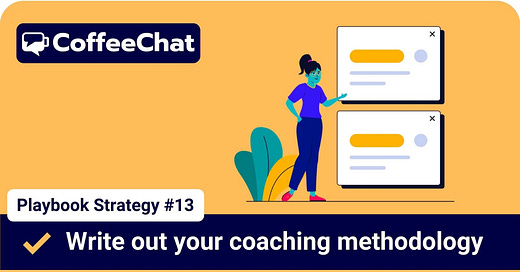Weekly Coach Spotlight
This week we spotlight Florence, a Change Leadership Coach based in Johannesburg, South Africa. Read the full spotlight article to learn more about her approach to coaching. Here’s a short preview of why she became a coach:
My greatest motivation was giving back. I realised I have so much experience in leading change both as a change specialist and having experienced and overcome significant change challenges in my own life. I just felt it is such a necessary skill to help people build, both as leaders and in their own life.
Introducing our Playbook for Coaches & Experts
CoffeeChat’s mission is to make 1-on-1 coaching more affordable, accessible and relevant in emerging markets. In Africa alone, there are an estimated 15 million managers (people who oversee others) working in formal organizations, companies, and governments. To realistically enable access to coaches for a lot more of those leaders, there will need to be a dramatic increase in experienced professional deciding to meaningfully structure their own independent coaching and consulting practices, either part-time or full-time.
Many people are interested but don’t know how to go about it. When they do begin, it’s often hard to maintain a sustainable practice. To support the growth in available coaches and experts, we have developed a new “playbook” with 100 practical strategies, including links to related tools and templates, to guide individuals to develop and grow their independent businesses.
The playbook will be released on 21st March 2021. You can pre-order starting now to receive a 20% discount (use discount code: preorder). The purchase of this playbook also includes a 1-hour 1-on-1 call with CoffeeChat's founder, Chris Suzdak, who has interviewed hundreds of coaches across Africa, giving him a broad perspective on best practices - which informed the creation of this playbook. During this session, you will review which strategies and tools from this playbook will be most relevant to you based on your current coaching or consulting practice.
Don’t have the budget to purchase the playbook right now? Don’t worry - we’ll be sharing one strategy tip preview from the playbook each week going forward (see below for the first one).
Write Out Your Coaching Methodology
In our weekly playbook preview tip for coaches, we cover a topic that falls under the theme of “Build & Monitor Your Niche”:
Whether you follow a particular methodology that you've been trained and certified in, or if you have developed your own based on experience, its important to take the time to write it out. This documentation will be helpful not only for your prospective clients, but also for yourself.
Coaching and consulting encompasses a very wide range of methodologies. As a result, you'll likely spend a lot of time during discovery sessions and panels explaining what you do and what you do not, relative to other types of coaches and consultants. This can actually be time well spent (within reason) in order to avoid confusion or misalignment with a prospective client. When you clearly articulate your methodology, it will help clarify if they instead actually want or need a different type of support, which can help prevent taking on a client who is in fact not a good fit for what you would like to offer.
You should develop two written versions of your methodology: one in which you describe your approach at a high-level which you can include in marketing and public-facing materials, and also a detailed version that is similar to a course syllabus which you can use to guide an engagement once the client is onboard. Its also advisable to include aspects of your methodology within your service agreement template (see Strategy #10).
Your methodology should address questions such as:
what does a typical session look like?
will you provide templates and tools for them to engage with?
is there a beginning, middle and end to your engagement?
Is it ok to keep an ongoing coaching relationship or will you insist on closing?
will they be expected to do tasks between sessions, such as a journal or reading?
is your methodology based on specific research or assessments?
Be sure to explain in which ways you can be flexible and where you are inflexible for some aspects of your approach and why - using examples, principles, certification guidelines, and/or logical reasoning.
This is particularly important if you are not following or using a well-established methodology. Some people who have been successful in their leadership and business life believe they can simply handle clients as they have their direct reports and mentees in the former roles, but if you are providing independent coaching or consulting services, its critical to formalize and professionalize your process since this is now your core offering.





